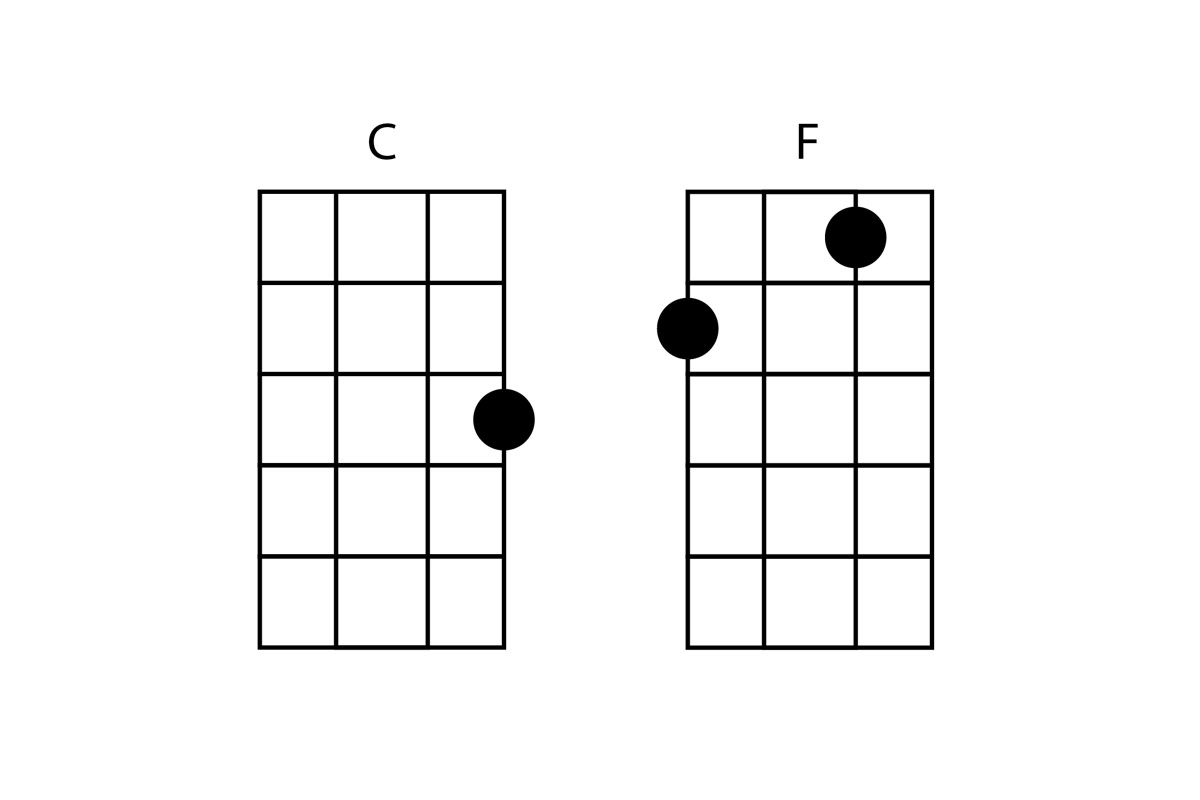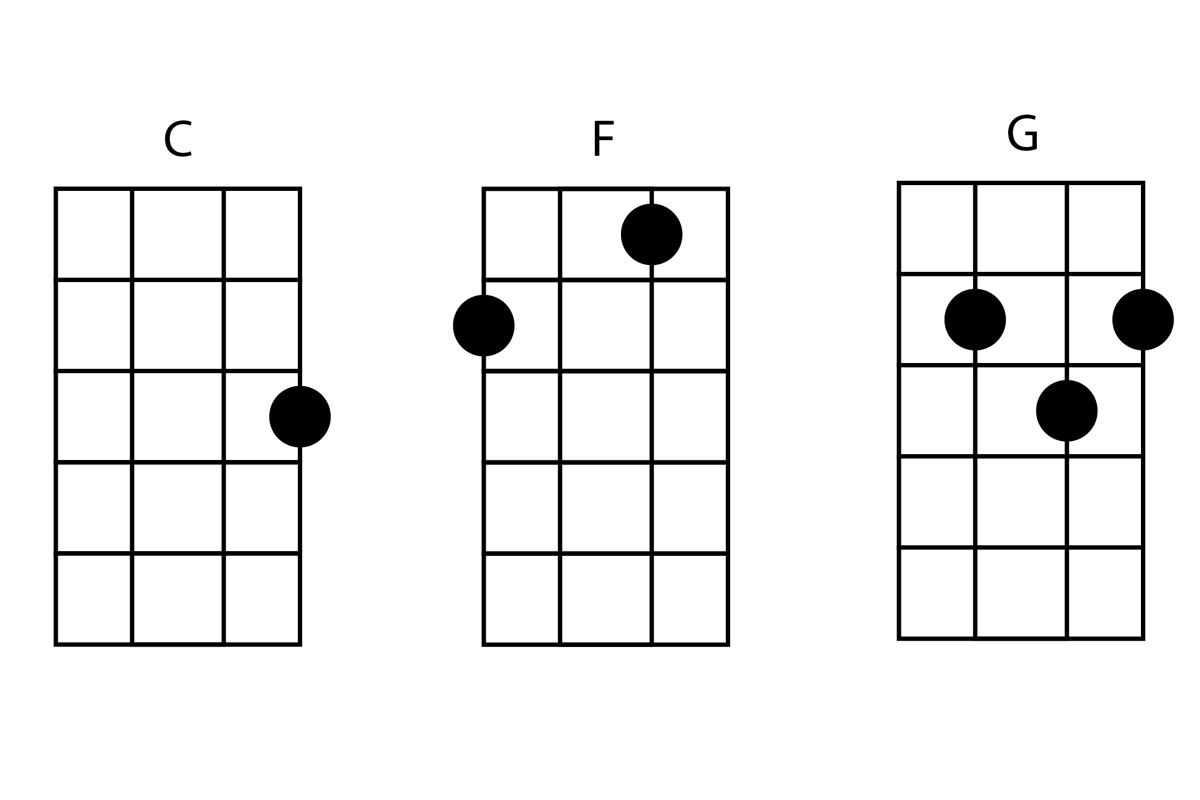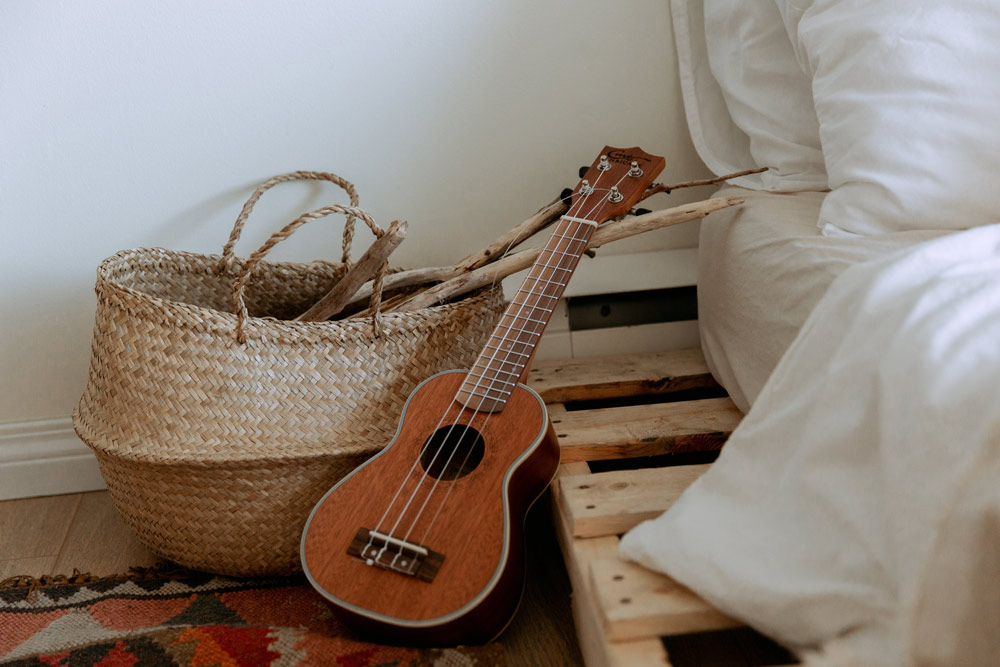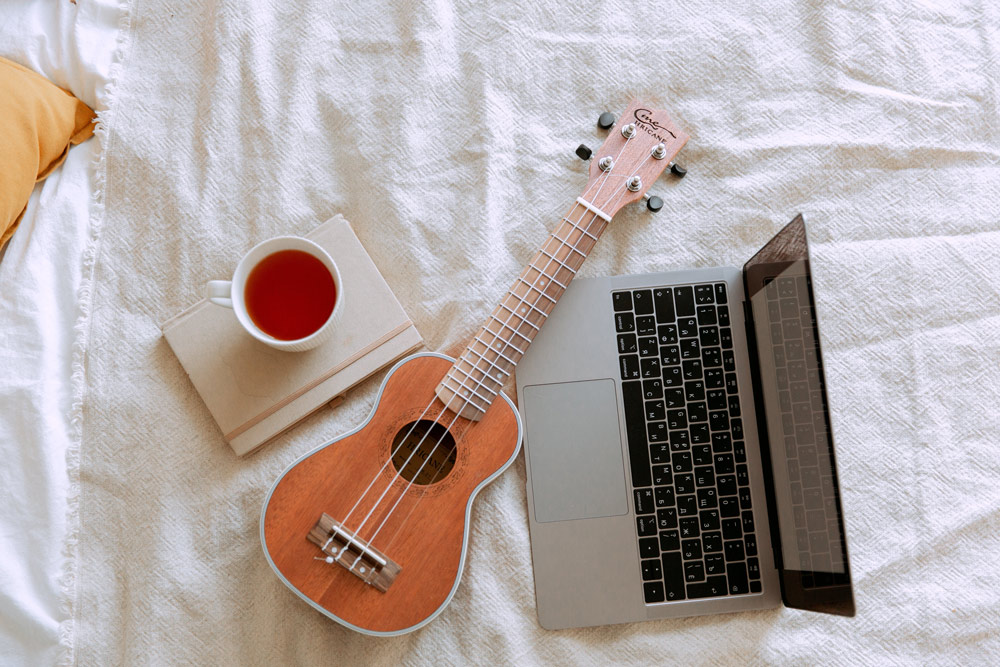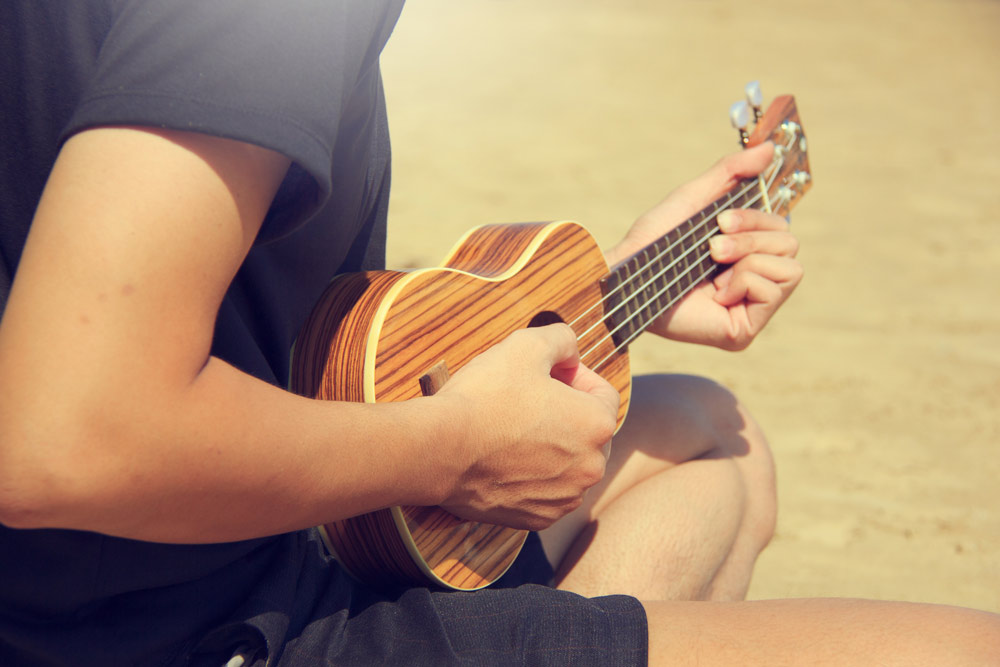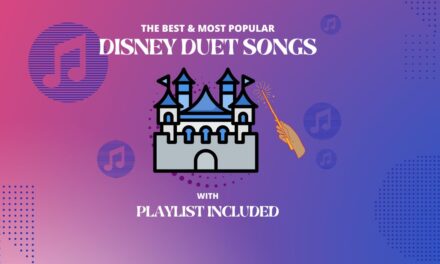Learning any musical instrument (or any skill) can be more challenging to some individuals but no matter your background, YOU can play the ukulele – it will just take some time to practice and build up the muscle memory.
You may have heard of individuals that are “musically-inclined”, meaning they have a natural talent for music. I am here to tell you that you do not have to be gifted in the art of music to play the ukulele – or any instrument for that matter.
In general, the ukulele is not a hard instrument to play. When compared to other instruments, it has one of the easiest learning curves. This makes it one of the most popular instruments in the world and in just a short amount of time, beginners can be playing basic chords and songs.
Of course, mastering the ukulele could take a lifetime but most people can pick up simple songs in a matter of days or weeks. The amount of time put into practice will be the main factor in how quickly you can pick up certain chords and songs.
I have worked with many beginners who began with the ukulele and there are some important points to note that can help you on your musical journey.
You will have days that you feel disheartened by your progress – but there will also be days that you feel uplifted with the new skills you have acquired. No matter what… know that YOU have the power to play the ukulele and you should not let anything get you down with learning this instrument.
Table of Contents:
Why the Ukulele is not Hard to Learn
- Chord Structure is Easy on the Fingers
- Easy to Sing Songs with the Ukulele
- Songs with Simple Chords can be Picked up Quickly
- Ukuleles can be Taken Anywhere – Very Small and Portable
- Good Quality Ukuleles are Affordable
Challenges when Beginning to Play the Ukulele
Why the Ukulele is not Hard to Learn
Chord Structure is Easy on the Fingers
Some of the most basic chords on the ukulele are quite easy on the fingers to play. In fact, the most popular ukulele chord, the C major chord, is only played using a single finger on the 3rd fret of the 1st string. The next most popular chord, the F major chord, is playing with only two fingers on the fretboard.
When compared to other string instruments like the guitar, banjo, or mandolin, the ukulele is much easier to play common chords.
This fact does not make the ukulele any less of an instrument than other strings, it is unique and happens to be one of the easiest to learn chords with. Not only that, but the ukulele is a wonderful instrument for those individuals looking for an instrument for backing up vocals.
Easy to Sing Songs with the Ukulele
The ukulele is such an amazing instrument for those who want a rhythm instrument for backup to their vocals. If you are looking to sing your heart out but lack the musical ability to play an instrument, then the ukulele is a perfect choice to start sharing that voice of yours. Because of the build and structure of the ukulele, it works as a fantastic rhythm instrument for singing. With the ability to learn chords much quicker than other instruments, you can be singing and playing songs in no time!
P.S. Keep in mind that no matter how YOU feel about your voice, there are those friends and family that appreciate your talent and will want to hear you sing and play no matter what. We are our own worst critics. Get out there and play and sing your heart out!
Songs with Simple Chords can be Picked up Quickly
Since the ukulele has an easy structure with chords, learning new songs can come quickly. You can turn just about any song into a ukulele version from classic rock standards to new-age pop music. You could even learn hundreds of different songs with just the three most popular chords on the ukulele – C, F, and G.
Amazingly, with just 4 nylon strings, the ukulele can play just about anything from Beethoven’s classical pieces to the newest pop single from Adele.
Ukuleles can be Taken Anywhere – Very Small and Portable
One of the greatest perks of owning a ukulele is the ability to take it anywhere! This makes practice time come much easier since you can take it with you wherever you go. The more you practice, the better your playing will get, and having a portable instrument means you can play it in the most obscure of places. This also allows you to encourage a fresh creative flow as you play music in new places as opposed to your practice space at your home. You could take it to the park, sling it on your back for a hiking trip, or play it to pass the time while waiting around at the airport.
Trust Me: Having a Ukulele at the airport will help you stay busy for any time you have to deal with those pesky delays or cancellations.
Good Quality Ukuleles are Affordable
In my experience, one of the main barriers of entry for beginners is the ability to afford a nice instrument that will complement their growth. That is not to say that one needs to spend thousands of dollars on a high-quality instrument – but having a ukulele that is of good quality will help with your learning experience.
Purchasing the cheapest instrument available can stunt your musical growth and make it more challenging to learn. Fortunately, good-quality ukuleles do not have to break the bank. Since they are a small instrument and have a more basic build compared to others, the cost of materials comes at a much more forgiving price, and you can walk away with a new quality ukulele for $100.
You can purchase ukuleles with higher quality components, but we believe that as a beginner, spending around $100 will get you the quality instrument you need.
Challenges when Beginning to Play the Ukulele
As with any new skill set, learning a musical instrument can be a long, challenging journey and at times can be discouraging and difficult to move past mental blocks or new techniques. Here are some challenges that most beginners will deal with at some point and some tips on how to avoid or improve upon them.
Getting Discouraged and Giving Up
This will happen to every beginner at some point as they hit a learning block or get frustrated at the lack of progress from practice. This WILL happen. It also happens to more advanced players of all instruments and musical genres. It is important to understand that it is important to give yourself the proper self-love and continue to push forward with your musical momentum. Do NOT let anything get you down or discourage you.
Playing a musical instrument is a difficult and time-consuming journey but if you stick with it, the joy that comes with playing music for yourself or for others is something that cannot be replicated with other hobbies.
If you get frustrated or find yourself in a musical “rut”, simply put the instrument down and take a break until you are relaxed enough to come back and play even better than before. Taking a mental break can sometimes be the best thing for your practice.
Trying Techniques or Songs that are More Advanced
This is a common setback for many new players, regardless of their instrumentation. Frequently, beginners might get bored of basic concepts and want to “skip” certain methods to learn more advanced songs or techniques.
This can lead to poor technique and bad habits for a new player and should be avoided. While it may be fun to skip ahead and learn a song that is out of your skill range, it is important to keep your focus on techniques that fall within your level of playing. Don’t let that hold you back from trying to learn that one difficult song that you absolutely adore – just keep in mind to not make that your primary focus to avoid learning bad habits from the beginning of your musical journey.
Incorrect Finger Positioning
The correct finger positioning for certain chords may not come as naturally as you would think. For example, it is natural for individuals to avoid using the pinky finger when learning new scales or chords but not using it as an efficient way of using your whole hand can lead to poor technique. Keep this in mind when learning new chords or arpeggios and refer to chord charts to understand the proper placement of each finger.
Starting the Instrument with Poor Technique
Think of learning the ukulele as the same journey as a child growing up. An individual is most vulnerable as a child and will pick up habits and techniques that will be with them the rest of their life. Trying to remove or change a bad habit later in life is much more difficult than making the change as a child. The same goes for the beginning stages of your musical journey.
If you decide to skip on key fundamentals for proper technique, then that could follow you down the musical journey – making it much harder to improve upon more advanced playing styles. Understandably, learning some of the core fundamentals can be a bit of a drag – the correct position of your hand, the proper way to strum, and the movement of your shoulders and elbows do not exactly fit the bill for the most exciting things to learn.
Skipping out on these important techniques and fundamentals can have negative long-term effects and should not be ignored. It is essential to keep an eye on your technique and posture throughout the beginning stages of your musical journey. That does not mean that you cannot have fun by jumping into your favorite tunes… just make room for both: playing music and core fundamentals.
Beginning with a Low-Quality Instrument
It is always going to be tempting to cut corners and choose a more affordable instrument, but a low-quality instrument can hinder your progress for a few reasons.
First and foremost, a low-quality ukulele might not sound nearly as good as a quality instrument and can be a solid reason to get discouraged and not want to play. Secondly, a low-quality instrument could assist in developing a poor technique for a beginner and could potentially create bad habits to be carried on to more advanced playing.
Fortunately, the ukulele is such an affordable instrument, and you can purchase a quality instrument without paying hundreds or thousands of dollars.
Going at it Alone: No Teachers or Techniques
This challenge is certainly up for debate among many individuals in the musical community. You may have heard of many people that have been self-taught and went about their musical journey without any guidance and they turned out to be incredibly skilled players.
While this is incredibly possible and each person learns in their own unique way, it should not discredit the benefits of learning from a qualified teacher. Having a ukulele teacher can help with learning the right techniques from the beginning and could improve your playing much quicker than going at it alone.
While not everyone can afford private lessons, there are many great online resources available to beginners. Online learning centers like ArtistWorks.com offer many different courses taught by recognizable and respectable teachers in the music industry. Courses like this offer an affordable way to learn from a professional without dishing out the funds for private lessons and can teach you many things that you would have otherwise not even considered.
Is the Ukulele Hard or Easy to Learn?
Overall, the ukulele is one of the easiest instruments to learn and is something that can be picked up by anybody – regardless of age or musical skill.
If you are ready to begin your ukulele musical journey, we recommend checking out some quality instruments from SweetWater.com and choosing a beginner ukulele course from ArtistWorks.
Remember: Never let anything get you down and never let anything (or anybody) get in your way from learning and playing the ukulele. You CAN do it – and with the right amount of time and practice, the sky is the limit.


